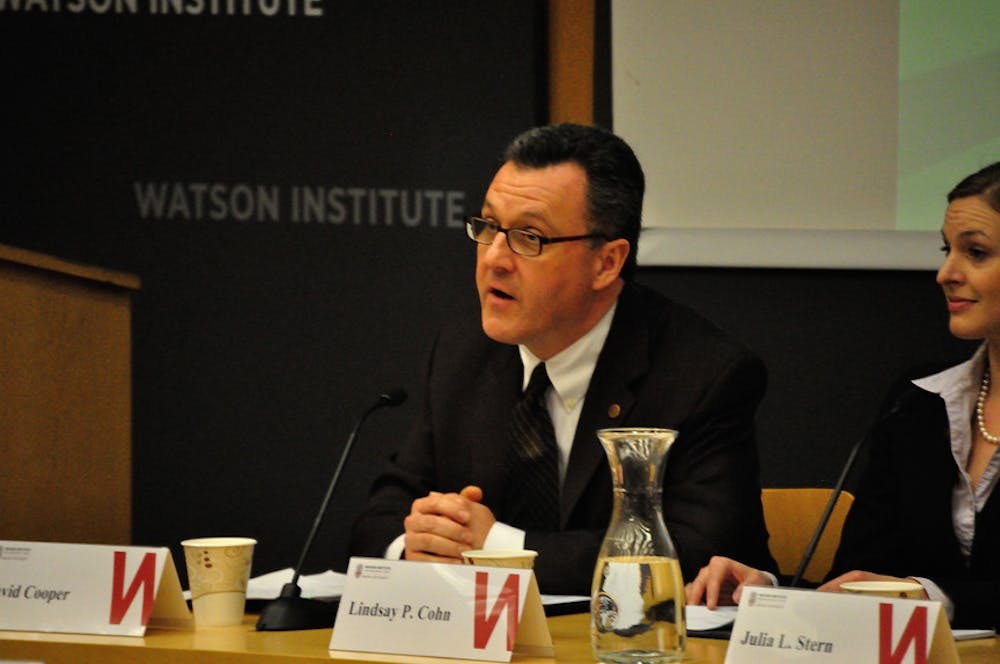Why do the best soldiers in the world keep losing? Four speakers grappled with this question, posed by James Fallows in his recent Atlantic article “The Tragedy of the American Military,” at a panel Tuesday at the Watson Institute for International Studies.
A crowd of about 50 community members from Brown and the U.S. Naval War College — which has an ROTC partnership with the University — filled the Joukowsky Forum for the panel, entitled “In and Out of Uniform: Civil-Military Relations Reconsidered.” Panelists presented a wide range of perspectives on Fallows’ assertion that American civilians’ lack of deeper understanding of the military leads to limited oversight and accountability for the armed forces.
Lindsay Cohn, assistant professor of national security affairs at the Naval War College, dissected Fallows’ argument that the military is dangerously isolated, partisan and unrepresentative of the U.S. population. While the military is indeed partisan, she said, Fallows’ other claims are largely untrue. Addressing the issue of partisanship, Cohn noted that only the officer corps are largely Republican, while the enlisted corps are much more diverse.
Contrary to popular belief and Fallows’ argument, the poorest 20 percent of the U.S. population is “the only quintile that is underrepresented in the military,” Cohn said, adding that “people with family ties to the military, who are also more likely to be Republican, are no more likely to feel that the wars were worth fighting.” The relationship between civilians and the armed forces is more complicated than it may seem, she said.
Lauren Sukin ’16 told The Herald she was particularly interested in Cohn’s claim “that people from the South and people in poverty aren’t overrepresented.” Sukin said she has seen many military recruiters visit schools in the South, and she believes Cohn was “underplaying the regional representation” in the armed forces.
Cohn stressed the importance of ongoing public debate and better education as a foundation for a better understanding of the military. By emphasizing science and math over history, philosophy and politics, “you’re not doing democracy any favors,” Cohn said in the question-and-answer session following the panel.
Martin Cook, professor of professional military ethics at the Naval War College, agreed with Cohn that the U.S. military is not well-understood by civilians, though he added that it “is respected and honored at a distance.”
“It is too easy to allow our out-of-sight, out-of-mind force to go into harm’s way” and think “thanking them at the airport” is enough repayment, Cook said. This mentality results in repeatedly deploying “the same individuals” and allows the government to use the military “with impunity,” he said.
Julia Stern ’08, founder and executive director of The Service Project, drew on her experiences attending Brown and working in Washington, D.C. to explore the relationship between millennials and the military. She cited her own lack of knowledge of the military as a Brown student as an example of the disconnect between young people and the armed forces.
“If this super-connected generation is not willing to reach out and communicate … particularly in situations of national security, that is going to become a much more exacerbated problem down the road,” Stern said.
The final panelist, Catherine Lutz, professor of anthropology and international studies, discussed the portrayal of “war weariness” in the media since 2006. She argued that the term “war weariness,” which has been used most frequently to describe the American public but also in reference to the U.S. military, Iraqis and Afghans involved in conflict, is a “passive descriptor” that acts as “a muted stand-in for suffering.”
Lutz identified two possible explanations for war fatigue in the American public: general tiredness of hearing the same story repeated in the news and an actual ideological opposition to U.S. intervention in other countries.
Jim Gardner ’65 MA’68 told The Herald he attended the panel because he hoped to learn more about issues surrounding civil-military relations, adding that he believes the Naval War College is one of the best places in the world to study foreign policy. Gardner served in Vietnam but took a leave of absence from the Navy to attend Brown, where he participated in the naval ROTC.
Jessica Katzenstein GS said she attended the event because she is interested in the 1033 Program, which transfers surplus military equipment to the police. Katzenstein said she was “surprised to see the diversity of opinions” represented on the panel, adding that she had only made assumptions about figures on civilian representation in the armed forces before the panel.
The event, titled “In and Out of Uniform: Civil-Military Relations Reconsidered,” was cosponsored by the Watson Institute and the Naval War College. The event included two panels followed by a conversation with Fallows via video.





